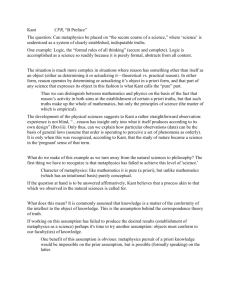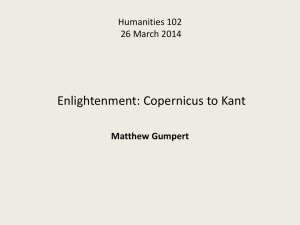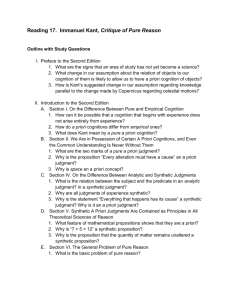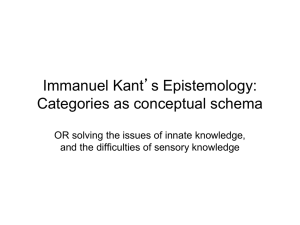Phil 21 – Anderson Writing Assignment on Kant
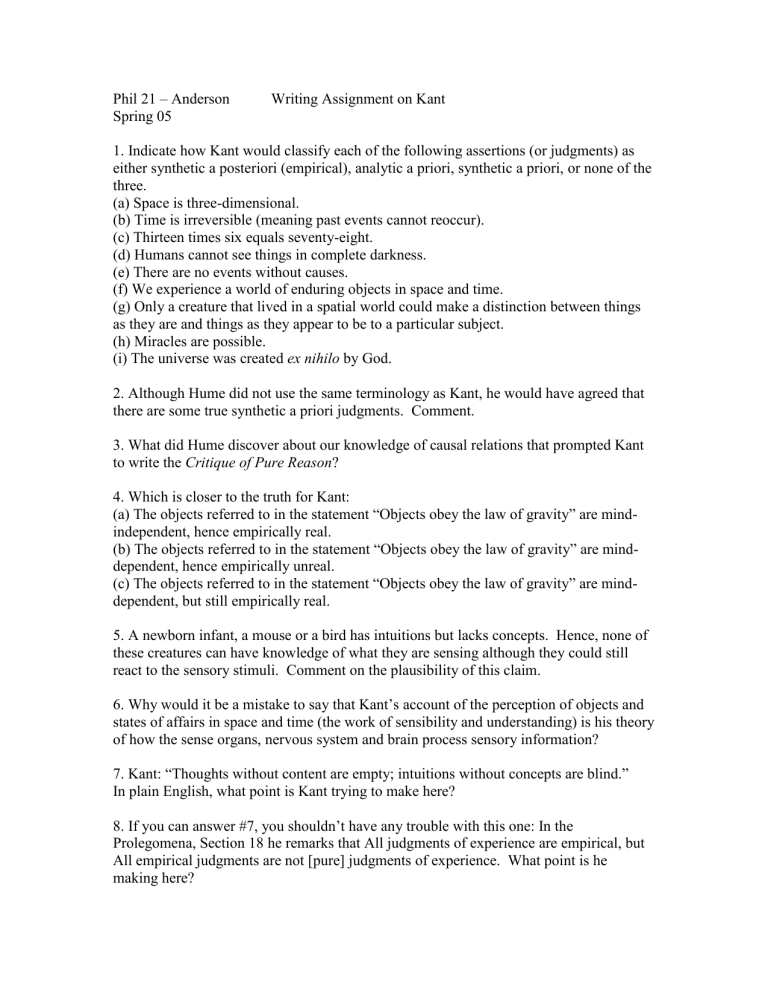
Phil 21 – Anderson Writing Assignment on Kant
Spring 05
1. Indicate how Kant would classify each of the following assertions (or judgments) as either synthetic a posteriori (empirical), analytic a priori, synthetic a priori, or none of the three.
(a) Space is three-dimensional.
(b) Time is irreversible (meaning past events cannot reoccur).
(c) Thirteen times six equals seventy-eight.
(d) Humans cannot see things in complete darkness.
(e) There are no events without causes.
(f) We experience a world of enduring objects in space and time.
(g) Only a creature that lived in a spatial world could make a distinction between things as they are and things as they appear to be to a particular subject.
(h) Miracles are possible.
(i) The universe was created ex nihilo by God.
2. Although Hume did not use the same terminology as Kant, he would have agreed that there are some true synthetic a priori judgments. Comment.
3. What did Hume discover about our knowledge of causal relations that prompted Kant to write the Critique of Pure Reason ?
4. Which is closer to the truth for Kant:
(a) The objects referred to in the statement “Objects obey the law of gravity” are mindindependent, hence empirically real.
(b) The objects referred to in the statement “Objects obey the law of gravity” are minddependent, hence empirically unreal.
(c) The objects referred to in the statement “Objects obey the law of gravity” are minddependent, but still empirically real.
5. A newborn infant, a mouse or a bird has intuitions but lacks concepts. Hence, none of these creatures can have knowledge of what they are sensing although they could still react to the sensory stimuli. Comment on the plausibility of this claim.
6. Why would it be a mistake to say that Kant’s account of the perception of objects and states of affairs in space and time (the work of sensibility and understanding) is his theory of how the sense organs, nervous system and brain process sensory information?
7. Kant: “Thoughts without content are empty; intuitions without concepts are blind.”
In plain English, what point is Kant trying to make here?
8. If you can answer #7, you shouldn’t have any trouble with this one: In the
Prolegomena, Section 18 he remarks that All judgments of experience are empirical, but
All empirical judgments are not [pure] judgments of experience. What point is he making here?
9. Kant is probably wrong in thinking that space is euclidean, but he could still be right that space is an a priori form of intuition. Is this a plausible thing to say?
10. For Kant, we cannot describe the world as it is in-itself, only as it appears to us. But
Kant is not a skeptic (meaning a person who denies the objectivity of empirical knowledge). T or F
11. A Kantian transcendental inquiry into knowledge cannot tell us whether there are cars, cabbages, or cows, but it can tell us that whatever we experience must be spatial and temporal and there must be things that obey causal laws and endure even when not being perceived.
12. In his Metaphysical Deduction of the Categories, Kant includes the category of negation. That amounts to the claim that in order to have knowledge at all, we must have the capacity to make negative judgments. Give one plausible reason why he is almost certainly correct about this, that is, we could not claim to know anything objective if we could not make negative judgments as well as affirmative ones.
13. Crudely put, Kant’s Transcendental Deduction of the Categories attempts to show that I could not have a concept of my self, as a subject of experiences in time, unless I also have a concept of an external world outside my mind. This seems to dovetail nicely with the findings of developmental psychology. Newborn infants don’t come into the world with a clear grasp of a self distinct from the external world, they have to acquire that distinction. And the sense of self appears not to happen until they can discriminate between what is going on in the world around them and their own subjective experiences.
Does this fact support Kant’s argument, or is it irrelevant to it?






